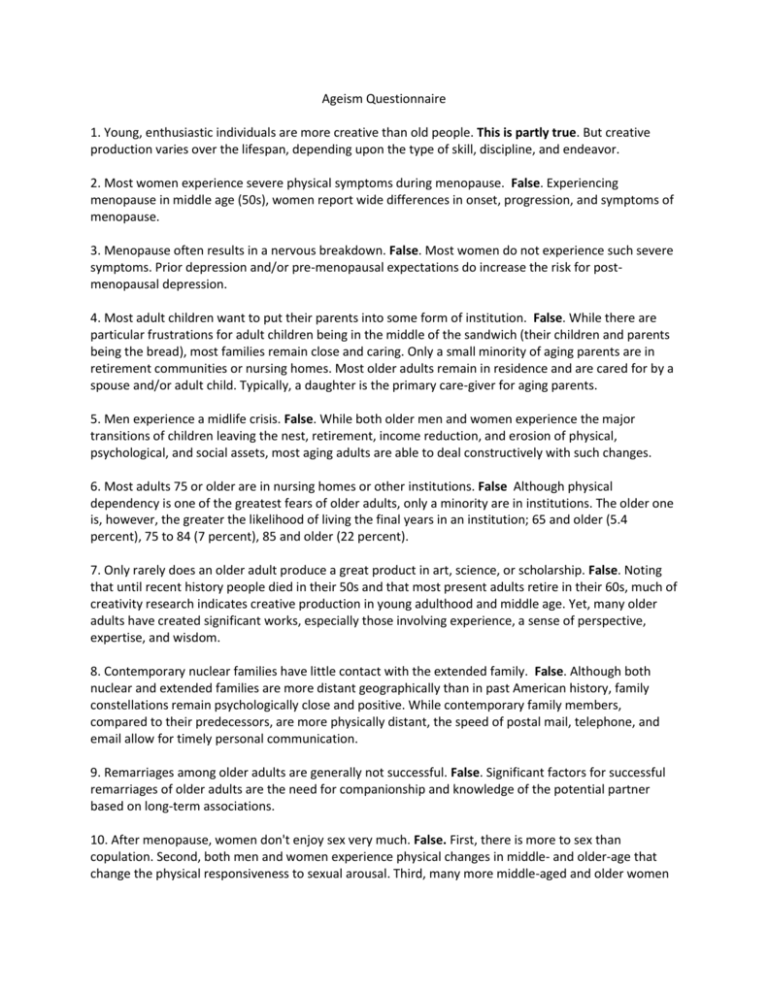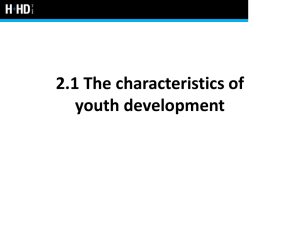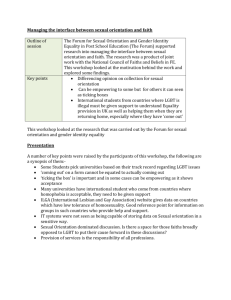
Ageism Questionnaire
1. Young, enthusiastic individuals are more creative than old people. This is partly true. But creative
production varies over the lifespan, depending upon the type of skill, discipline, and endeavor.
2. Most women experience severe physical symptoms during menopause. False. Experiencing
menopause in middle age (50s), women report wide differences in onset, progression, and symptoms of
menopause.
3. Menopause often results in a nervous breakdown. False. Most women do not experience such severe
symptoms. Prior depression and/or pre-menopausal expectations do increase the risk for postmenopausal depression.
4. Most adult children want to put their parents into some form of institution. False. While there are
particular frustrations for adult children being in the middle of the sandwich (their children and parents
being the bread), most families remain close and caring. Only a small minority of aging parents are in
retirement communities or nursing homes. Most older adults remain in residence and are cared for by a
spouse and/or adult child. Typically, a daughter is the primary care-giver for aging parents.
5. Men experience a midlife crisis. False. While both older men and women experience the major
transitions of children leaving the nest, retirement, income reduction, and erosion of physical,
psychological, and social assets, most aging adults are able to deal constructively with such changes.
6. Most adults 75 or older are in nursing homes or other institutions. False Although physical
dependency is one of the greatest fears of older adults, only a minority are in institutions. The older one
is, however, the greater the likelihood of living the final years in an institution; 65 and older (5.4
percent), 75 to 84 (7 percent), 85 and older (22 percent).
7. Only rarely does an older adult produce a great product in art, science, or scholarship. False. Noting
that until recent history people died in their 50s and that most present adults retire in their 60s, much of
creativity research indicates creative production in young adulthood and middle age. Yet, many older
adults have created significant works, especially those involving experience, a sense of perspective,
expertise, and wisdom.
8. Contemporary nuclear families have little contact with the extended family. False. Although both
nuclear and extended families are more distant geographically than in past American history, family
constellations remain psychologically close and positive. While contemporary family members,
compared to their predecessors, are more physically distant, the speed of postal mail, telephone, and
email allow for timely personal communication.
9. Remarriages among older adults are generally not successful. False. Significant factors for successful
remarriages of older adults are the need for companionship and knowledge of the potential partner
based on long-term associations.
10. After menopause, women don't enjoy sex very much. False. First, there is more to sex than
copulation. Second, both men and women experience physical changes in middle- and older-age that
change the physical responsiveness to sexual arousal. Third, many more middle-aged and older women
than men do not have a sexual partner. Fourth, responding to sexual arousal often occurs without a
partner.
11. Older adults are not very interested in sexual activities. False. Kissing/hugging, sexual touching,
sexual intercourse, oral sex, self-stimulation, and sexual thoughts represent sexual activities. While
there is an age-related decrease in sexual activities, older adults remain sexual active. Interestingly, the
age-related decrease in partnered sexual intercourse begins in the thirties. Partners married or living
together report higher satisfaction with sexual activities than single adults. More men, throughout the
adult lifespan, report thinking about sex and its importance, than women.
12. Retirement often results in physical and psychological health deterioration. False. Work is important
to most of us. If work is the singular contributor to a sense of self-worth, then forced retirement (due to
illness, work-related frustration, subtle age discrimination) can result in both physical and psychological
health problems. Fortunately, most of us have other things contributing to our sense of self-worth, such
as spouse, family, friends, avocations, interests, organizations, and volunteerism. Interestingly, in recent
years, more adults are retiring earlier than the Social Security benefits trigger of 65. Folks who retire
early often do so because of a sense of financial security. Also of interest is the finding (Friedrich 2001)
that many baby-to-aging boomers expect to both retire early and work part-time in retirement
13. One's personality is relatively stable during adulthood. True. While priorities and plans change
throughout life, basic personality traits remain remarkably stable. With the following five primary
personality traits (dimensions), have you remained fairly consistent over the years?
14. Achievement motivation is highest in young adulthood. False. Older adults do have lower
achievement motivation related to career advancement, as other priorities, including realistic appraisal
of competition, become more important. With inner work standards (motivation to perform at one's
best, sense of responsibility, persistence), older adults do not show significant declines over the years.
15. Older adults should remain active to keep their spirits up. True. With advancing age comes loss—
reduced physical well-being, retirement, loss of significant others, less active socialization. With activity,
especially that involving significant others, comes higher life satisfaction for older adults. Intimate
activity involves relations with spouse, family, friends, and meaningful organizations.
16. Older adults prefer to reduce their activities and friendships. False. While certain activities and
acquaintances change or are reduced in older age, emotional closeness with significant others starts to
increase in middle-age. Beginning in middle-age, selectivity of relationships becomes more important. It
may be that older adults become more selective with relationships to maintain or increase emotional
ties with others. Older adults do disengage from work; they do not disengage from social relations.
Older adults are much less likely than younger adults to engage in strenuous physical activities. But,
older adults continue to engage in physical pursuits.
17. Old dogs can't learn new tricks. False. Both old dogs and humans do learn new things. Learning will
take longer; learning goals and standards will be different; and much of the new will not be attempted.
In a youth and middle-age oriented American society, it may be difficult to appreciate the lack of
interest for many older adults in becoming computer literate. For many older adults, aside from another
correspondence avenue with children and grandchildren, computer literacy is not important.
Maintaining driving privileges, requiring knowledge of rules of the road, however, remains very
important to many older adults.
18. Given declines in a number of cognitive abilities in older age, old people don't benefit much from
educational opportunities. False.
Motivation and prior levels of education are key factors For life-long learning pursuits. Fewer retirees
are involved in academic or job-related educational opportunities. The higher level of educational
advancement, the more likely it is for an older adult to seek life-long learning opportunities. And, many
older adults are active in life-long learning pursuits dealing with avocations, hobbies, organizations, and
interests. Another issue is that of accessibility. Life-long learning opportunities via the internet, for
example, are not used by older adults (or anyone else) who is not computer literate.
19. Intellectual performance peaks in early adulthood and then steadily declines. False.
Intelligence represents a complex set of systems, processes, and behaviors. Some intellectual abilities do
peak in early adulthood and then decline (at different rates and levels). Other abilities either continue to
increase over the lifespan or increase, then reach a plateau. Those intellectual abilities that do peak in
earlier adulthood, such as sensory capabilities, reaction time, and speed of processing information, are
closely related to the integrity of the nervous system. Those abilities that continue to increase, then
plateau throughout the lifespan, such as language skills, practical intelligence, and work-related skills,
are associated with learning opportunities. Since learned abilities are also dependent on the integrity of
the nervous system, serious deterioration of the nervous system associated with cerebral disorders
(stroke, Alzheimer's disease) leads to marked erosion of learned abilities. Even into old-old age (85 years
and older), many older adults with mild to moderate chronic diseases illustrate good intellectual
performance.
20. Older adults illustrate more wisdom than younger folks. Partly true.
To be wise requires knowledge of facts, knowledge of obtaining and providing information, sense of
personal context for making decisions, relativism for the problem and values, and appreciation of
uncertainty of possible solutions. These attributes of wisdom require much experience. Yet, living a long
life is not a prerequisite for wisdom. There are a lot of old people who are narrow-minded. Being
exposed to, and appreciating, diverse problems, solutions, values, and people throughout the lifespan
provides us with opportunities to become wiser.
21. The primary reason women live longer than men is that women do not have to work as hard. False.
For many, many generations, over different cultures, women have lived significantly longer than men.
The answer, as yet understood at the cellular level, is directly related to the gender difference in the sex
chromosome. It is genetically determined.
22. Soon, the human lifespan will increase to 150 or 200 years of age. False. Because of better nutrition,
sanitation, medical technology, education, and medical access, humans live longer than in past
generations. But, each species has a maximum longevity. To date, a French women achieved the record
longevity before dying—122 years and 5 months. Very few humans reach the age of 100. In 2000, there
were 65,000 centenarians. Keys to longer life are heredity, weight control, positive psychological wellbeing, and avoidance of heavy cigarette smoking and alcohol use.
23. Adults over 65 are generally unhealthy. Partly true. While almost all older adults report their general
health, relative to others of the same age, as good, the risk of disease rises dramatically after the midsixties. And, with advancing age, the risk increases correspondingly. For example, adults over 65
represent 12.5 percent of the population, but are responsible for 30 percent of health-care
expenditures. The majority of older adults have at least one chronic physical condition; arthritis is the
most common illness, followed by hypertension and hearing problems.
24. It is possible to worry yourself sick. Partly true. Probably regardless of age, stress is a significant
factor associated with many diseases. A high level of sustained stress is the result of one's environment,
including personal physical and psychological conditions. Type A personalities (very competitive,
impatient, hostile), for example, are at significant risk for cardiovascular problems.
25. Most older adults become senile sooner or later. False. The two major types of senility are
Alzheimer's Disease and cerebrovascular disease. The latter accounts for about 20 percent of senility.
The incidence of Alzheimer's Disease is approximately 5 percent for adults 65 and older, 20 percent for
those 85 and older, and 40 percent for adults 90 and older.
26. Unmarried adults are more likely to have mental illness than married partners.
Partly true. Married women have a significantly higher rate of diagnosed mental illness than married
men. But, for the categories of being single, divorced, or widowed, men have a higher rate than women.







